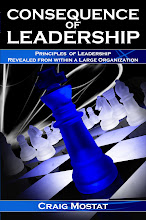A recent discussion on LinkedIn began with the question, "The one quality a successful leader should "NOT" possess, according to you would be... ." The following are a summary of some of the responses provided by various participants:
- Arrogance – Not to be confused with confidence
- Cowardice
- Inability to listen (to people with organization, customer, leader's, survey or even our own intuition)
- Taking all credit for success & blaming others for failure
- Fear
- Greed
- Too rigid
- Big ego
- Refusing to admit their mistakes
As I survey this list, the one word that comes to mind is "character". Leadership is about character. Good character = good leadership, bad character = bad leadership. How do you define character? The dictionary that I found on my desk (The Merriam Webster) reads; the complex of mental and ethical traits marking a person or group. The Encarta Dictionary reads; distinctive qualities; the set of qualities that make somebody or something distinctive, especially somebody's qualities of mind and feeling.
Character is who you are – it determines how you will react in any given situation. It is your conscience, habits, beliefs and attitudes. The shaping and forming of your character starts when you are very young and continues throughout your life. The modeling of your character depends upon how you deal with and react to the events and situations that come at you in life. It comes out of the choices that you have made in life.
The bittersweet part is; the greater the challenge in life – the greater the character building opportunity. Those that have faced the biggest trials in life have the most profound character. However, depending on the choices made in life – some people's character is overwhelmingly positive and some negative. This is the reason that when hiring for key leadership positions, wise organizations look for failure or crisis in the background of the applicants. They understand that those who have come through major challenges successfully will be much better leaders than those who have not.
I write both to share, and to learn. The writing of this article has helped me to answer a question that has plagued me for many years. I have always believed that leadership is not something that you were born with and that it cannot just be taught – it must be learned – it is a skill, but more than that. I have encountered many over the years that have had profound problems with leadership. In order to try to "fix" them, they were sent off to some kind of leadership school. They usually return with a new lease on life and profound revelation on leadership. While, there is usually some change, the old negative traits are still in them and eventually find their way to the surface. Based on this, I began to doubt that someone could change his or her ability to lead. Intuitively, I knew that they were not born with a certain style, but yet, I could not reconcile this issue.
My epiphany is character. I can study and learn about positive, influential leadership principles and become a leading expert on the subject. But, it is my character that allows or prevents me from using them [principles]. To change my leadership, I need to first change my character.
So, how does one change their character? Make better decisions in reaction to what life brings you. The problem is that one has to be willing to accept that their character is flawed in order to make the necessary changes. That takes humility.
So if all this is true, why is the price of admission to many organizations, letters beside your name signifying a business degree? How can we determine character? Ask those that have been exposed to it – not those that have seen an act or performance (superiors) – ask those that have seen the real (subordinates).
Bookmark this on Delicious




No comments:
Post a Comment